(完整word版)非谓语动词翻译练习
非谓语动词翻译练习
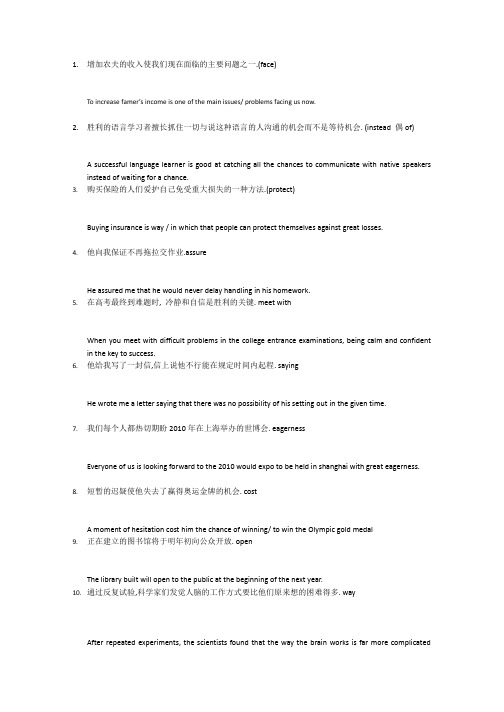
1.增加农夫的收入使我们现在面临的主要问题之一.(face)To increase famer’s income is one of the main issues/ problems facing us now.2.胜利的语言学习者擅长抓住一切与说这种语言的人沟通的机会而不是等待机会. (instead 偶of)A successful language learner is good at catching all the chances to communicate with native speakersinstead of waiting for a chance.3.购买保险的人们爱护自己免受重大损失的一种方法.(protect)Buying insurance is way / in which that people can protect themselves against great losses.4.他向我保证不再拖拉交作业.assureHe assured me that he would never delay handling in his homework.5.在高考最终到难题时, 冷静和自信是胜利的关键. meet withWhen you meet with difficult problems in the college entrance examinations, being calm and confident in the key to success.6.他给我写了一封信,信上说他不行能在规定时间内起程. sayingHe wrote me a letter saying that there was no possibility of his setting out in the given time.7.我们每个人都热切期盼2010年在上海举办的世博会. eagernessEveryone of us is looking forward to the 2010 would expo to be held in shanghai with great eagerness.8.短暂的迟疑使他失去了赢得奥运金牌的机会. costA moment of hesitation cost him the chance of winning/ to win the Olympic gold medal9.正在建立的图书馆将于明年初向公众开放. openThe library built will open to the public at the beginning of the next year.10.通过反复试验,科学家们发觉人脑的工作方式要比他们原来想的困难得多. wayAfter repeated experiments, the scientists found that the way the brain works is far more complicatedthan they had thought.11.这篇文章用简洁的英语写成,很简洁懂. easyWritten in simple English , the essay is easy to understand12.从她的表情来看,他肯定已经知道结果. judge fromJudging from his expression, he must have known the result13.发觉学生下午昏昏欲睡的样子,老师竭尽所能来激发他们的爱好. arouseFinding students sleepy in the classroom, the teacher did everything he could to arouse their interest. 14.为了挽救那些禽流感患者,医生们日夜工作,废寝忘食. bird fluIn order to save those who suffered from bird flu, the doctor worked day and night, forgetting /neglecting their meals and sleep.15.说实话, 我真懊悔没有帮助他克服困难regretTo tell you the truth, I really regret not helping him overcome the difficulties.16.这些广告旨在吸引消费者购买商品. appealThe aim of these advertisements is to appeal to customers to buy goods. These advertisements aim at appealing to customers to buy goods17.他碰巧以前做过这个练习. happenHe happens to have done the exercise before.18.他的安排听上去很不错, 可我们执行起来却肯定困难重重.difficultyHis plan sounds quite good, but we are sure to have much difficulty in carrying it out.19.现代通讯技术使人们相互保持联系变得更加便利. …it..Modern communication technology has made it more convenient for people to keep in touch with each other.20.孩子须要照看,由你来确定谁留下来. up toThe baby needs to be looked after/ looking after. it is up to you to decide who is to stay behind21.看来他们家可能发生了一些出人意料的事情. seem toSomething unexpected seemed to have happened to their family.22.他因为做错了事向在场的全部人致歉. apologizeHe apologize to all the people present for having done something23.因特网使我们不出家门便知天下事. make…possibleThe internet makes it possible for us to be informed of what is going on outside the world without leaving home.24.是在对不起, 在过去几个月里给你添了不少麻烦. troubleI am terribly sorry to have given you a lot of trouble / have trouble you a lot in the past few months25.我认为这次失败不该怪我, 相反, 应当指责经理玩忽职守. blame, accuseI don’t think I am to blame for the failure . instead, the manager should be accused of having neglected his duty.。
完整word版,动名词翻译练习题
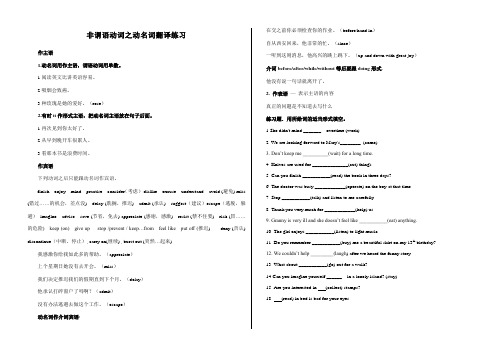
非谓语动词之动名词翻译练习作主语1.动名词用作主语,谓语动词用单数。
1.阅读英文比讲英语容易。
2.吸烟会致癌。
3.种玫瑰是她的爱好。
(rose)2.有时it作形式主语,把动名词主语放在句子后面。
1.再次见到你太好了。
2.从早到晚开车很累人。
3.看那本书是浪费时间。
作宾语下列动词之后只能跟动名词作宾语。
finish enjoy mind practise consider(考虑)dislike excuse understand avoid (避免) miss (错过……的机会,差点没) delay (耽搁,推迟) admit (承认) suggest(建议)escape(逃脱,躲避)imagine advise save (节省,免去) appreciate (感谢,感激) resist (禁不住要) risk (冒……的危险) keep (on) give up stop /prevent / keep…from feel like put off (推迟) deny (否认) discontinue(中断、停止), carry on(继续) , burst out (突然…起来)我感激你给我如此多的帮助。
(appreciate)上个星期日她没有去开会。
(miss)我们决定推迟我们的假期直到下个月。
(delay)他承认打碎窗户了吗啊?(admit)没有办法逃避去做这个工作。
(escape)动名词作介词宾语: 在交之前你必须检查你的作业。
(before/hand in)自从西安回来,他非常的忙。
(since)一听到这则消息,他高兴的跳上跳下。
(up and down with great joy)介词before/after/while/without等后要跟doing形式.他没有说一句话就离开了。
2. 作表语—表示主语的内容真正的问题是不知道去写什么练习题.用所给词的适当形式填空。
1.She didn't mind _______overtime.(work)2. We are looking forward to Mary's________. (come) .3. Don’t keep me __________(wait) for a long time.4. Knives are used for ______________(cut) things.5. Can you finish ___________(read) the book in three days?6. The doctor was busy ____________(operate) on the boy at that time.7. Stop ___________(talk) and listen to me carefully.8. Thank you very much for ____________(help) us.9. Granny is very ill and she doesn’t feel like ___________(eat) anything.10. The girl enjoys ___________(listen) to light music.11. Do you remember ___________(buy) me a beautiful skirt on my 13th birthday?12. We couldn’t help _________(laugh) after we heard the funny story.13. What about ___________(go) out for a walk?14.Can you imagine yourself ______in a lonely island? (stay)15. Are you interested in (collect) stamps?18. (read) in bed is bad for your eyes.Reading English is easier than speaking it. 。
(完整版word)非谓语动词训练题含答案
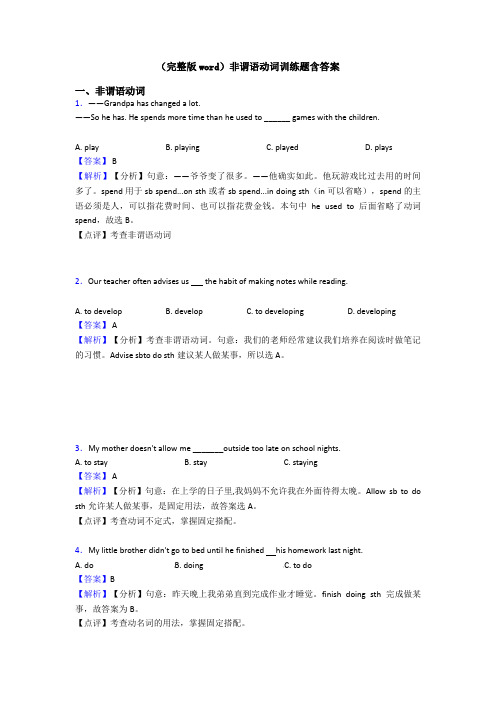
(完整版word)非谓语动词训练题含答案一、非谓语动词1.——Grandpa has changed a lot.——So he has. He spends more time than he used to ______ games with the children.A. playB. playingC. playedD. plays【答案】 B【解析】【分析】句意:——爷爷变了很多。
——他确实如此。
他玩游戏比过去用的时间多了。
spend用于sb spend...on sth或者sb spend...in doing sth(in可以省略),spend的主语必须是人,可以指花费时间、也可以指花费金钱。
本句中he used to后面省略了动词spend,故选B。
【点评】考查非谓语动词2.Our teacher often advises us the habit of making notes while reading.A. to developB. developC. to developingD. developing【答案】 A【解析】【分析】考查非谓语动词。
句意:我们的老师经常建议我们培养在阅读时做笔记的习惯。
Advise sbto do sth建议某人做某事,所以选A。
3.My mother doesn't allow me _______outside too late on school nights.A. to stayB. stayC. staying【答案】 A【解析】【分析】句意:在上学的日子里,我妈妈不允许我在外面待得太晚。
Allow sb to do sth允许某人做某事,是固定用法,故答案选A。
【点评】考查动词不定式,掌握固定搭配。
4.My little brother didn't go to bed until he finished his homework last night.A. doB. doingC. to do【答案】B【解析】【分析】句意:昨天晚上我弟弟直到完成作业才睡觉。
非谓语动词讲解和练习(附答案)

非谓语动词非谓语动词是英语语法中的一个重要概念,指的是在句子中不能单独作谓语,但又具有动词特征的动词形式。
一、种类非谓语动词主要包括三种形式:不定式(Infinitive)、动名词(Gerund)和分词(Participle)。
1.不定式基本形式是“to + 动词原形”(有时可省略to),例如“to study”、“to play”等。
它具有名词、形容词和副词的特征,可在句中充当主语、宾语、表语、定语、状语和补足语等成分。
To see is to believe.(作主语和表语)I want to learn English.(作宾语)2.动名词形式上是动词原形加-ing,和现在分词的形式一样,如“swimming”、“reading”等。
动名词在句中主要起名词的作用,可充当主语、宾语、表语和定语。
Swimming is my favorite sport.(作主语)I enjoy reading books.(作宾语)3.分词现在分词:也是动词原形加-ing,它既有动词特征,又有形容词和副词特征,可作定语、状语、表语和补足语。
The running boy is my brother.(作定语)Hearing the news, she couldn’t help crying.(作状语)过去分词:通常是动词原形加-ed(规则变化)或有其特殊的不规则变化形式,如“broken”、“written”等。
过去分词常表示被动或完成的意义,同样能充当定语、状语、表语和补足语等成分。
The broken cup is on the table.(作定语)Given more time, I can do it better.(作状语)二、用法区别1.作主语时不定式作主语常表示具体的某一次动作或行为,常用“It + be + 形容词+ (for/of sb.) + to do sth.”这样的结构,It is important for us to learn English well.动名词作主语往往表示抽象的、一般性的行为或概念。
(完整版word)非谓语动词用法总结附解析

(完整版word)非谓语动词用法总结附解析一、非谓语动词1.It was raining. My father asked me _______ a raincoat.A. takeB. takesC. tookD. to take【答案】 D【解析】【分析】句意:正下雨。
我父亲要我带上雨衣。
根据关键词 asked me,再结合选项,可判断出此处考查的是 ask sb. to do sth.的用法,故答案选 D。
【点评】考查固定搭配ask sb. to do sth.。
2.Our teacher often advises us the habit of making notes while reading.A. to developB. developC. to developingD. developing【答案】 A【解析】【分析】考查非谓语动词。
句意:我们的老师经常建议我们培养在阅读时做笔记的习惯。
Advise sbto do sth建议某人做某事,所以选A。
3.My mother doesn't allow me _______outside too late on school nights.A. to stayB. stayC. staying【答案】 A【解析】【分析】句意:在上学的日子里,我妈妈不允许我在外面待得太晚。
Allow sb to dosth允许某人做某事,是固定用法,故答案选A。
【点评】考查动词不定式,掌握固定搭配。
4.Nowadays,most people prefer to________ computer games rather than ___________ books.A. play;readingB. play;readC. playing; reading【答案】 B【解析】【分析】句意:现在,大部分人比起读书更喜欢玩电脑游戏。
prefer to doA rather than do B比起B更喜欢做A。
(完整版word)非谓语动词用法总结及解析
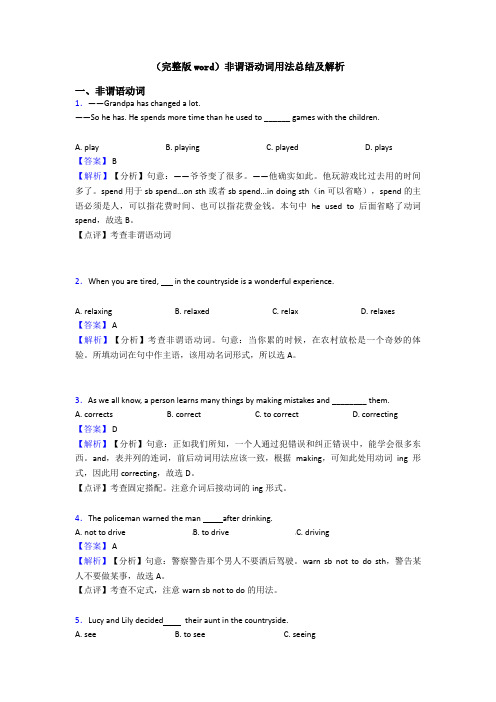
(完整版word)非谓语动词用法总结及解析一、非谓语动词1.——Grandpa has changed a lot.——So he has. He spends more time than he used to ______ games with the children.A. playB. playingC. playedD. plays【答案】 B【解析】【分析】句意:——爷爷变了很多。
——他确实如此。
他玩游戏比过去用的时间多了。
spend用于sb spend...on sth或者sb spend...in doing sth(in可以省略),spend的主语必须是人,可以指花费时间、也可以指花费金钱。
本句中he used to后面省略了动词spend,故选B。
【点评】考查非谓语动词2.When you are tired, in the countryside is a wonderful experience.A. relaxingB. relaxedC. relaxD. relaxes【答案】 A【解析】【分析】考查非谓语动词。
句意:当你累的时候,在农村放松是一个奇妙的体验。
所填动词在句中作主语,该用动名词形式,所以选A。
3.As we all know, a person learns many things by making mistakes and ________ them.A. correctsB. correctC. to correctD. correcting【答案】 D【解析】【分析】句意:正如我们所知,一个人通过犯错误和纠正错误中,能学会很多东西。
and,表并列的连词,前后动词用法应该一致,根据making,可知此处用动词ing形式,因此用correcting,故选D。
【点评】考查固定搭配。
注意介词后接动词的ing形式。
4.The policeman warned the man after drinking.A. not to driveB. to driveC. driving【答案】 A【解析】【分析】句意:警察警告那个男人不要酒后驾驶。
非谓语动词翻译练习
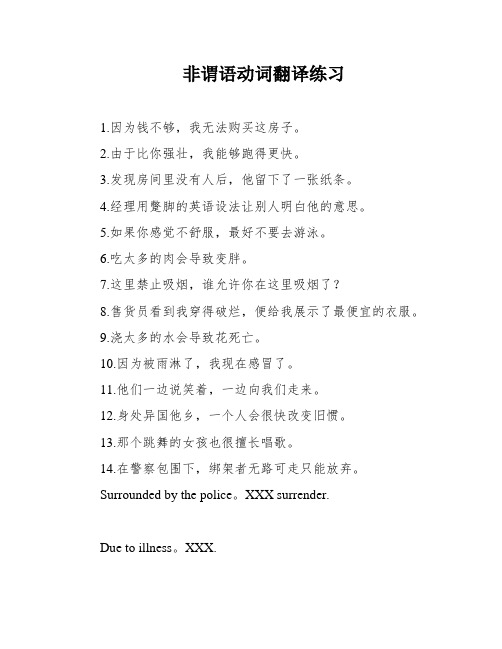
非谓语动词翻译练习1.因为钱不够,我无法购买这房子。
2.由于比你强壮,我能够跑得更快。
3.发现房间里没有人后,他留下了一张纸条。
4.经理用蹩脚的英语设法让别人明白他的意思。
5.如果你感觉不舒服,最好不要去游泳。
6.吃太多的肉会导致变胖。
7.这里禁止吸烟,谁允许你在这里吸烟了?8.售货员看到我穿得破烂,便给我展示了最便宜的衣服。
9.浇太多的水会导致花死亡。
10.因为被雨淋了,我现在感冒了。
11.他们一边说笑着,一边向我们走来。
12.身处异国他乡,一个人会很快改变旧惯。
13.那个跳舞的女孩也很擅长唱歌。
14.在警察包围下,绑架者无路可走只能放弃。
Surrounded by the police。
XXX surrender.Due to illness。
XXX.1.With his hands clasped behind him。
XXX in the room for ten minutes.2.Lost in the big and crowded supermarket。
poor Jack XXX.3.The two war XXX。
XXX.4.XXX is also used in other English-speaking countries.5.The issue currently being discussed at the meeting will be voted on in two weeks' time.6.It is often quoted as a warning for children not to leave their XXX to the cold wind.7.The old farmer liked to walk around in the field in his free time and did not like to stay at home.XXX during his free time。
(完整版word)非谓语动词知识点题型含答案
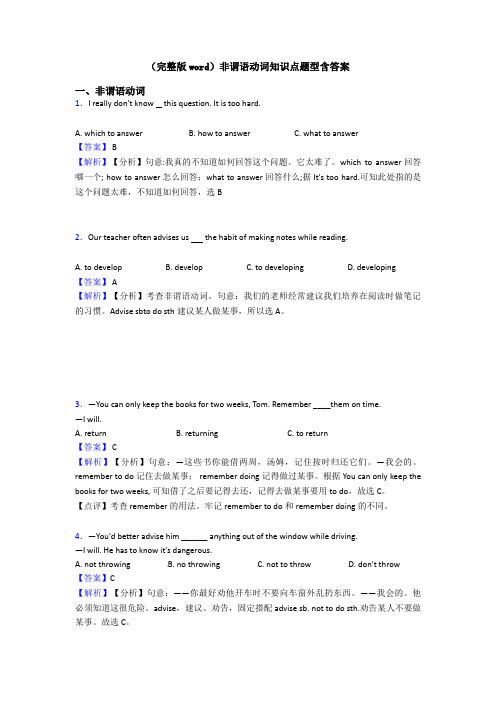
(完整版word)非谓语动词知识点题型含答案一、非谓语动词1.I really don't know this question. It is too hard.A. which to answerB. how to answerC. what to answer【答案】 B【解析】【分析】句意:我真的不知道如何回答这个问题。
它太难了。
which to answer回答哪一个; how to answer怎么回答;what to answer回答什么;据It's too hard.可知此处指的是这个问题太难,不知道如何回答,选B2.Our teacher often advises us the habit of making notes while reading.A. to developB. developC. to developingD. developing【答案】 A【解析】【分析】考查非谓语动词。
句意:我们的老师经常建议我们培养在阅读时做笔记的习惯。
Advise sbto do sth建议某人做某事,所以选A。
3.—You can only keep the books for two weeks, Tom. Remember ____them on time.—I will.A. returnB. returningC. to return【答案】 C【解析】【分析】句意:—这些书你能借两周,汤姆,记住按时归还它们。
—我会的。
remember to do记住去做某事; remember doing记得做过某事。
根据You can only keep the books for two weeks, 可知借了之后要记得去还,记得去做某事要用to do,故选C。
【点评】考查remember的用法。
牢记remember to do和remember doing的不同。
非谓语动词中译英练习200句
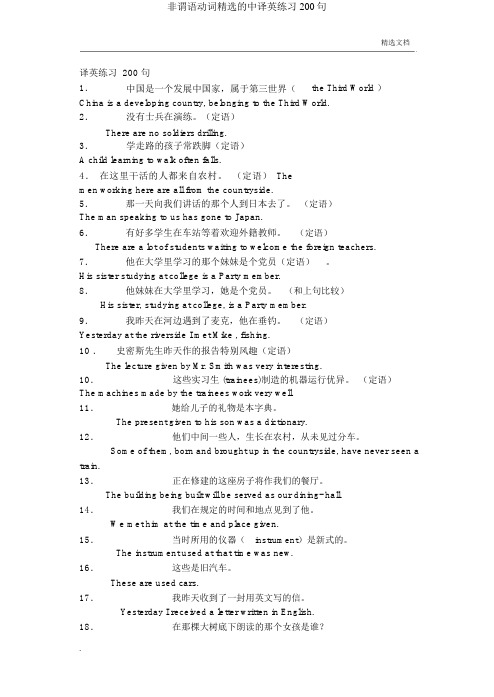
精选文档译英练习 200 句1.中国是一个发展中国家,属于第三世界(the Third World )China is a developing country, belonging to the Third World.2.没有士兵在演练。
(定语)There are no soldiers drilling.3.学走路的孩子常跌脚(定语)A child learning to walk often falls.4.在这里干活的人都来自农村。
(定语)Themen working here are all from the countryside.5.那一天向我们讲话的那个人到日本去了。
(定语)The man speaking to us has gone to Japan.6.有好多学生在车站等着欢迎外籍教师。
(定语)There are a lot of students waiting to welcome the foreign teachers.7.他在大学里学习的那个妹妹是个党员(定语)。
His sister studying at college is a Party member.8.他妹妹在大学里学习,她是个党员。
(和上句比较)His sister, studying at college, is a Party member.9.我昨天在河边遇到了麦克,他在垂钓。
(定语)Yesterday at the riverside I met Mike , fishing.10 .史密斯先生昨天作的报告特别风趣(定语)The lecture given by Mr. Smith was very interesting.10.这些实习生 (trainees)制造的机器运行优异。
(定语)The machines made by the trainees work very well.11.她给儿子的礼物是本字典。
(完整版word)真题非谓语动词含答案解析

(完整版word)真题非谓语动词含答案解析一、非谓语动词1.Running ______ a good way to exercise every day.A. isB. wasC. areD. were【答案】A【解析】【分析】句意:每天跑步是一种锻炼的好方式。
“跑步”作句子的主语,动词短语作主语,用成动名词形式;动名词作主语时,谓语用第三人称单数形式。
故选A。
【点评】本题考查主谓一致。
以及is was ,are,were四个词的意义和用法。
2.Our teacher often advises us the habit of making notes while reading.A. to developB. developC. to developingD. developing【答案】 A【解析】【分析】考查非谓语动词。
句意:我们的老师经常建议我们培养在阅读时做笔记的习惯。
Advise sbto do sth建议某人做某事,所以选A。
3.—You'd better advise him ______ anything out of the window while driving.—I will. He has to know it's dangerous.A. not throwingB. no throwingC. not to throwD. don't throw【答案】C【解析】【分析】句意:——你最好劝他开车时不要向车窗外乱扔东西。
——我会的。
他必须知道这很危险。
advise,建议、劝告,固定搭配advise sb. not to do sth.劝告某人不要做某事。
故选C。
【点评】考查固定搭配advise sb. not to do sth.。
4.The policeman warned the man after drinking.A. not to driveB. to driveC. driving【答案】 A【解析】【分析】句意:警察警告那个男人不要酒后驾驶。
(完整版)非谓语动词的翻译练习-不定式
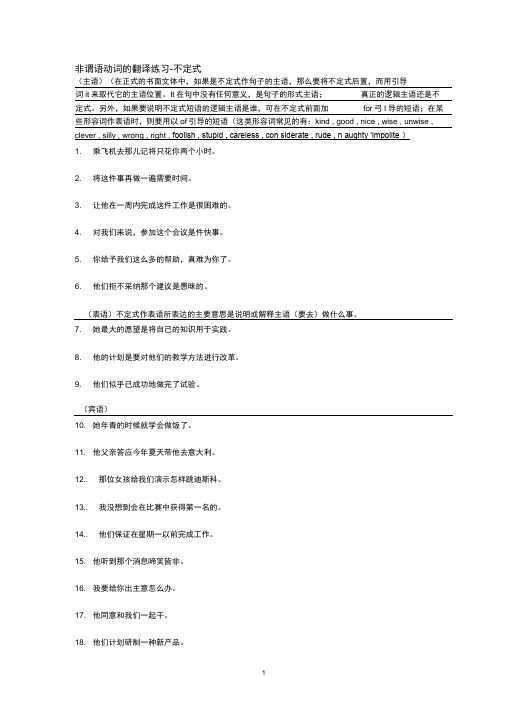
非谓语动词的翻译练习-不定式clever , silly , wrong , right , foolish , stupid , careless , con siderate , rude , n aughty ‘impolite )1. 乘飞机去那儿记将只花你两个小时。
2. 将这件事再做一遍需要时间。
3. 让他在一周内完成这件工作是很困难的。
4. 对我们来说,参加这个会议是件快事。
5. 你给予我们这么多的帮助,真难为你了。
6. 他们拒不采纳那个建议是愚昧的。
(表语)不定式作表语所表达的主要意思是说明或解释主语(要去)做什么事。
7. 她最大的愿望是将自己的知识用于实践。
8. 他的计划是要对他们的教学方法进行改革。
9. 他们似乎已成功地做完了试验。
(宾语)10. 她年青的时候就学会做饭了。
11. 他父亲答应今年夏天带他去意大利。
12.. 那位女孩给我们演示怎样跳迪斯科。
13.. 我没想到会在比赛中获得第一名的。
14.. 他们保证在星期一以前完成工作。
15. 他听到那个消息啼笑皆非。
16. 我要给你出主意怎么办。
17. 他同意和我们一起干。
18. 他们计划研制一种新产品。
定语(序数词first , second 等以及last, best, only 等词常用不定式来作它们的定语。
)19. 我们达成协议共同干这工作。
20. 她能讲四种语言。
21. 她有讲四种语言的能力。
22. 他们制订了一个研制新产品的计划。
23. 他无事可做。
24. 他们仍有许多要克服的困难。
状语(不定式作状语时,往往是接在不及物动词的后面,修饰谓语动词;表示谓语动作发生的目 _________ 的、结果、原因、程度)(作目的状语)25. 1.她昨天来看我了26. 他曾去新西兰深造过。
27. 那人为了养家不得不在业余时间做些另活。
28.. 要当尖子学生,你应更加努力学习(作结果状语)29.. 他在这个问题上说了这么一大些,只能暴露出他对解决问题的办法一无所知。
(完整版)非谓语动词翻译练习

非谓语动词翻译练习:I. Complete the senten ces.1) Success means _________________________________________ 非常努力地工作).2) Joh n meant __________________________________ (开车去那儿,但他的车岀了故障).3) I heard him _____________________________________________ 在跟他的母亲谈话).4) I heard him _____________________________________________ 跟他的母亲谈了一个小时).5) He jumped into the pool to save the child _____________________________________(结果却摔断了自己的腿).6) He jumped from the burning house, ________________________________ ( 摔断了双腿).7) He was happy ___________________________________________________ 看至0父母很健康).8) ____________________________________ 至父母安然无恙),he issued a sigh of relief.9) ______________________ 跟随着它的脚印),the zoologists spotted the hungry pan da.10) The pop, ______________________________ (后面跟着两个保镖),came to meet his fans.II. Tran slate the Chin ese into En glish.(请在句子划线部分使用非谓语动词或者独立主格结构)1、我钱不够,不能买这房子。
非谓语动词地中译英练习200句汉语
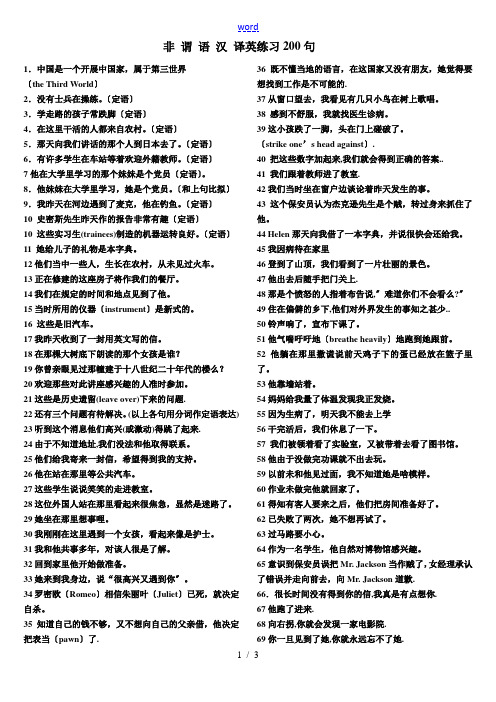
word非谓语汉译英练习200句1.中国是一个开展中国家,属于第三世界〔the Third World〕2.没有士兵在操练。
〔定语〕3.学走路的孩子常跌脚〔定语〕4.在这里干活的人都来自农村。
〔定语〕5.那天向我们讲话的那个人到日本去了。
〔定语〕6.有许多学生在车站等着欢迎外籍教师。
〔定语〕7他在大学里学习的那个妹妹是个党员〔定语〕。
8.他妹妹在大学里学习,她是个党员。
〔和上句比拟〕9.我昨天在河边遇到了麦克,他在钓鱼。
〔定语〕10 史密斯先生昨天作的报告非常有趣〔定语〕10 这些实习生(trainees)制造的机器运转良好。
〔定语〕11 她给儿子的礼物是本字典。
12他们当中一些人,生长在农村,从未见过火车。
13正在修建的这座房子将作我们的餐厅。
14我们在规定的时间和地点见到了他。
15当时所用的仪器〔instrument〕是新式的。
16 这些是旧汽车。
17我昨天收到了一封用英文写的信。
18在那棵大树底下朗读的那个女孩是谁?19你曾亲眼见过那幢建于十八世纪二十年代的楼么?20欢迎那些对此讲座感兴趣的人准时参加。
21这些是历史遗留(leave over)下来的问题.22还有三个问题有待解决。
(以上各句用分词作定语表达) 23听到这个消息他们高兴(或激动)得跳了起来.24由于不知道地址,我们没法和他取得联系。
25他们给我寄来一封信,希望得到我的支持。
26他在站在那里等公共汽车。
27这些学生说说笑笑的走进教室。
28这位外国人站在那里看起来很焦急,显然是迷路了。
29她坐在那里想事哩。
30我刚刚在这里遇到一个女孩,看起来像是护士。
31我和他共事多年,对该人很是了解。
32回到家里他开始做准备。
33她来到我身边,说“很高兴又遇到你〞。
34罗密欧〔Romeo〕相信朱丽叶〔Juliet〕已死,就决定自杀。
35知道自己的钱不够,又不想向自己的父亲借,他决定把表当〔pawn〕了. 36 既不懂当地的语言,在这国家又没有朋友,她觉得要想找到工作是不可能的.37从窗口望去,我看见有几只小鸟在树上歌唱。
高中英语2024届高考高级句式非谓语翻译练习(附参考答案)

高考英语高级句式非谓语翻译练习班级考号姓名总分一、2个谓语并列→非谓语:(V1and V2)→(V1,V2ing)或者(V1ing,V2)3个谓语并列→非谓语:(V1,V2and V3)→(V1and V2, V3ing)或者(V1ing,V2and V3)或者(V1,V2ing and V3ing)1.我低下头,流下后悔的泪水①(并列句)②(非谓语)2.Ryan拍我的肩膀,告诉我忘记这件事情。
①(并列句)②(非谓语)3.她跪下来,轻轻地把女孩抱在怀里。
(kneel down 跪下来, hold sb in the arms 把某人抱在怀里,gently轻轻地)①(并列句)②(非谓语)4. 简爬上树,摘了一些浆果吃。
(climb up爬上,berry浆果)①(并列句)②(非谓语)5. 保罗打开车门,对马克喊道:“马上上我的车!”①(并列句)②(非谓语)6. 紧紧抱着Tom,Jane突然大哭起来。
(burst out crying=burst into tears突然大哭起来)①(并列句)②(非谓语)7.靠近这个小动物的时候,我感到十分紧张。
(approach靠近)①(并列句)②(非谓语)8.Tom咬紧牙,用着火般的眼睛怒视着Jackson。
(clench咬紧,glare at怒视着,burning eyes 着火般的眼睛)①(并列句)②(非谓语)9.我们高兴地畅谈,享受家庭团聚的时刻。
(delightedly=pleasedly高兴地,family reunion 家庭团聚)①(并列句)②(非谓语)10.母亲点点头, 低声说:“谢谢你!”(murmur低声说)①(并列句)②(非谓语)11.他拍拍我的头,问道:“你的名字是什么?”(pat sb on the head拍某人的头,inquire=enquire询问)①(并列句)②(非谓语)12.她对我微笑,说:“当然有圣诞老人。
(Santa Clause圣诞老人)①(并列句)②(非谓语)13.他停下来,看到妻子正在哭泣。
非谓语动词的翻译题
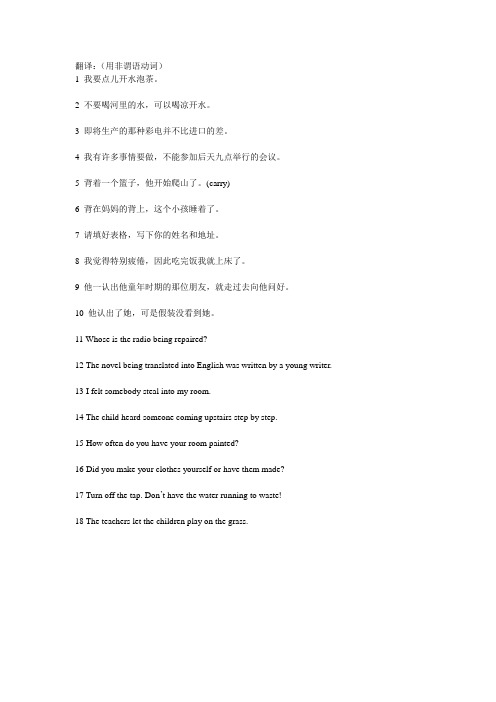
翻译:(用非谓语动词)1 我要点儿开水泡茶。
2 不要喝河里的水,可以喝凉开水。
3 即将生产的那种彩电并不比进口的差。
4 我有许多事情要做,不能参加后天九点举行的会议。
5 背着一个篮子,他开始爬山了。
(carry)6 背在妈妈的背上,这个小孩睡着了。
7 请填好表格,写下你的姓名和地址。
8 我觉得特别疲倦,因此吃完饭我就上床了。
9 他一认出他童年时期的那位朋友,就走过去向他问好。
10 他认出了她,可是假装没看到她。
11 Whose is the radio being repaired?12 The novel being translated into English was written by a young writer.13 I felt somebody steal into my room.14 The child heard someone coming upstairs step by step.15 How often do you have your room painted?16 Did you make your clothes yourself or have them made?17 Turn off the tap. Don’t have the water running to waste!18 The teachers let the children play on the grass.1 I want some boiling water to make tea.2 Don’t drink the water in the river, you can /may drink cold boiled water.3 The TV sets to be produced will be as good as those imported from abroad.4 I have a lot of things to do, so I don’t be able to attend the meeting to be held at nine the day after tomorrow.5 Carrying a basket on his back, he began to climb the hill.6 Carried on its mother’s back, the baby fell asleep.7 Please fill in the form, giving your name and address.8 Being very tired, I went to bed soon after super.9 Recognizing the old friend of his in his childhood, he went over to say hello to him.10 Having recognized her, he pretended not to have seen her.11 正在修理的那台收音机是谁的?12 正在翻译成英语的那本小说是一位青年作家写的。
非谓语动词翻译练习
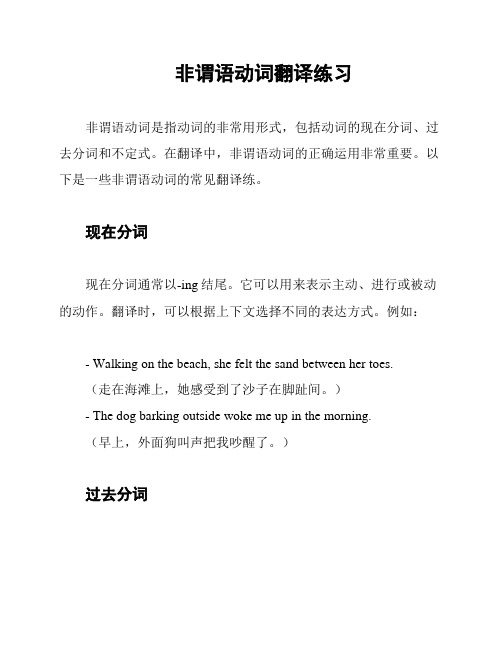
非谓语动词翻译练习非谓语动词是指动词的非常用形式,包括动词的现在分词、过去分词和不定式。
在翻译中,非谓语动词的正确运用非常重要。
以下是一些非谓语动词的常见翻译练。
现在分词现在分词通常以-ing结尾。
它可以用来表示主动、进行或被动的动作。
翻译时,可以根据上下文选择不同的表达方式。
例如:- Walking on the beach, she felt the sand between her toes.(走在海滩上,她感受到了沙子在脚趾间。
)- The dog barking outside woke me up in the morning.(早上,外面狗叫声把我吵醒了。
)过去分词过去分词通常以-ed、-d、-t、-en等形式结尾。
它可以表示被动、完成的动作或描述状态。
在翻译时,可以使用被动语态或形容词来表达。
例如:- The book was written by a famous author.(这本书是一位著名作家写的。
)- The broken window needs to be repaired.(这扇破窗户需要修理。
)不定式不定式是动词的原形,常以to开头。
它可以用作名词、形容词或副词,在句子中承担不同的角色。
翻译时,可以根据句子结构和内容选择合适的翻译方式。
例如:- To learn a foreign language is beneficial for one's career.(研究一门外语对职业发展有益。
)(他告诉我等会儿再回来。
)以上是非谓语动词的常见翻译练习。
希望这些例子能帮助你更好地理解和运用非谓语动词的翻译。
非谓语动词翻译练习题

非谓语动词翻译练习1.无视她的话,男人快步走了。
(doing)___________________________________________________________________________ 2.我尽最大努力控制马。
我努力保持平衡防止自己掉下来。
(2018浙江)___________________________________________________________________________ 3.当我们正要绝望的时候,我们听到了远处有微弱的声音。
___________________________________________________________________________ 4.她冷得无法忍受,精疲力竭,完全不知道该如何应对这种可怕的情况。
___________________________________________________________________________ 5.看到我做了什么,妈妈皱了皱眉头,好像是要我赶快站起来。
___________________________________________________________________________ 6.好奇心切,她从河岸边跑开,穿过田野,去追兔子。
___________________________________________________________________________ 7. 听到这句话,阿拉姆Aram高兴地跳了起来。
___________________________________________________________________________ 8.想要表现出我的善良,我弯下腰,捡起球,用尽全力把它扔回去。
___________________________________________________________________________ 9.走了很久,她发现自己迷路了。
非谓语动词doing,done, with 复合结构专项句子翻译练习

4.他又沮丧又低落,低着头,走在队伍的最后。
Depressed and low-spirited, he walked at the end of the line with his head hanging down/lowered/drooping(下垂).
n. [ C ] a loud sound without words that expresses a strong feeling
cry
(表达强烈感情的)叫喊,叫声
to give a cry of anguish/despair/relief/surprise/terror, etc.
发出痛苦、绝望、如释重负、惊讶、恐怖等的叫声
left/rendered(使处于某种状态)speechless.
13.他屏住呼吸,尽力不发出任何声音,免得让人知道他来了。 In order to not be noticed by others, he held his breath, trying not to make any sound. Holding his breath, he strived to stay silent, avoiding being noticed by others.
Burn
~ (with sth) ( literary ) to feel a very strong emotion or desire 有强烈的情感;渴望
to be burning with rage/ambition/love be burning with+情绪
满怀强烈的仇恨╱远大的抱负╱炽热的爱 be burning to do sth
非谓语动词专练(填空、造句、翻译)(可编辑修改word版)
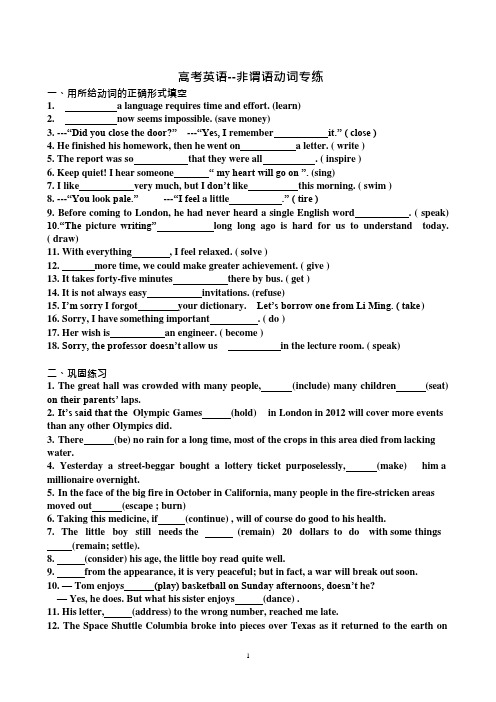
高考英语--非谓语动词专练一、用所给动词的正确形式填空1. a language requires time and effort. (learn)2.now seems impossible. (save money)3.---“Did you close the door?”---“Yes, I remember it.” ( close )4.He finished his homework, then he went on a letter. ( write )5.The report was so that they were all . ( inspire )6.Keep quiet! I hear someone “ my heart will go on ”. (sing)7.I like very much, but I don’t like this morning. ( swim )8.---“You look pale.”---“I feel a little .” ( tire )9.Before coming to London, he had never heard a single English word . ( speak)10.“The picture writing”long long ago is hard for us to understand today. ( draw)11.With everything , I feel relaxed. ( solve )12.more time, we could make greater achievement. ( give )13.It takes forty-five minutes there by bus. ( get )14.It is not always easy invitations. (refuse)15.I’m sorry I forgot your dictionary. Let’s borrow one from Li Ming. ( take)16.Sorry, I have something important . ( do )17.Her wish is an engineer. ( become )18.Sorry, the professor doesn’t allow us in the lecture room. ( speak)二、巩固练习1.The great hall was crowded with many people, (include) many children (seat) on their parents’ laps.2.It’s said that the Olympic Games (hold) in London in 2012 will cover more events than any other Olympics did.3.There (be) no rain for a long time, most of the crops in this area died from lacking water.4.Yesterday a street-beggar bought a lottery ticket purposelessly, (make) him a millionaire overnight.5.In the face of the big fire in October in California, many people in the fire-stricken areas moved out (escape ; burn)6.Taking this medicine, if (continue) , will of course do good to his health.(remain) 20 dollars to do with some things 7.The little boy still needs the(remain; settle).8.(consider) his age, the little boy read quite well.9.from the appearance, it is very peaceful; but in fact, a war will break out soon.10.— Tom enjoys (play) basketball on Sunday afternoons, doesn’t he?—Yes, he does. But what his sister enjoys (dance) .11.His letter, (address) to the wrong number, reached me late.12.The Space Shuttle Columbia broke into pieces over Texas as it returned to the earth onFebruary 1, 2003, (kill) all seven astronauts aboard.13.There are lots of places of interest (need; repair) in our city.14.— What caused the party to be put off?—Tom’s the invitations.15.I was afraid (talk) back to my customers because I was afraid of (lose) them.16.Standing on the top of the hill, I would not do anything but (enjoy) the flowing of the smog around me.17.— Is Tom a good talker?—No, he never speaks to me other than (ask) for something?18.I can’t get my car (run) on cold mornings, so I have to try with some hot water.19.The drunken husband knocked against the table and sent the bowls directions before he was sent (sleep) by his wife. (fill) the radiator(fly) in all20.When we got back from the cinema, we found the lamp (burn) on but the door(shut).21.We found the students seated at tables and had their eyes (fix) on the scene of the launch of Shenzhou V spaceship.22.A doctor can expect (call) at any hour of the day or night.23.The boy often gives a satisfactory answer to the teacher’s question, (think) just a minute. So he’s usually the teacher’s pet.24.The policeman came up to the lonely house with the door (open), (stand) there for a while and then entered it.25.I (drive) along the quiet road at forty miles an hour, and then an old man suddenly started to cross the road in front of me.26.Mr. Smith was much surprised to find the watch he had had (repair) was nowhere to be seen.27.What did the librarian (forbid; take) out of the library?28.— Mum, why do you give me so much popcorn?—(kill) the boring time.29.What Yang Liwei wanted to do when he got out of the spaceship was (share) the joy with all the Chinese.30.When she was alone at home, Mary needed a friend with whom (play) with.31.(see)the big snake, the little girl stood under the tree (frighten)out of life.32.The competitor never dreamed of there (be) a chance for him to win the first prize in the 100-meter race.33.Please fill in the form, (give) your name, address and telephone number.34.He had a wonderful childhood, (travel) with his mother to all corners of the world.35.W hen (compare) with the size of the whole earth, the highest mountain doesn’t seem high at all.36.(dress) in her best suit, the girl tried to make herself (notice) at the party.37.The matter (relate) to your study surely requires (deal) with carefully.38.Her (not come) back made her parents worried a lot.39.Everything (take) into consideration, they believed themselves more and returned to their positions.40.He moved away from his parents and missed them too much to enjoy the (excite) life in New York.41.— What do you think of the plan?—It’s easier said than (carry) out.42.Many businessmen attended the Boao Forum ( 博鳌论坛)because they knew what(get) from the forum.43.There was a famous person at the party whom everyone would like (introduce) to themselves.44.— Were you at home last Sunday?—Yeah! I devoted the whole day to (review) the English grammar.45.Once (catch; steal) at the shop, you will be dismissed immediately.46.Prices of daily goods (buy) through a computer can be lower than store prices.47.The summer vacation (be) over, John returned to school from his hometown.48.(suppose) she can’t come, who will do the work?49.— Is there anything you want from town?—No, thank you. But I would like to get those letters (mail).50.After the guests left, she spent as much time as she could (tidy) up the rooms.三、语法填空Freud was one of the first scientists [1] (make)serious research of the mind. The mind is the collection of activities [2] (base)in the brain that involve how we act, think, feel and reason. He used long talks with patients and the study of dreams [3](search)for the causes of mental and emotional problems. He also tried hypnosis. He wanted to see if [4] (put)patients into a sleep-like condition would help ease [5] (trouble)minds. In most cases he found the effects only temporary. Freud worked hard, although what he did might sound easy. His method involved [6] (sit) with his patients and [7] (listen)to them talk. He had them [8](talk)about whatever they were thinking. All ideas, thoughts and anything [9](enter)their mind had to be expressed. There could be no[10] (hold)back because of fear or guilt.四、翻译(划线部分用非谓语动词形式)1.下班后别忘记关灯。
- 1、下载文档前请自行甄别文档内容的完整性,平台不提供额外的编辑、内容补充、找答案等附加服务。
- 2、"仅部分预览"的文档,不可在线预览部分如存在完整性等问题,可反馈申请退款(可完整预览的文档不适用该条件!)。
- 3、如文档侵犯您的权益,请联系客服反馈,我们会尽快为您处理(人工客服工作时间:9:00-18:30)。
用非谓语动词翻译下列句子(Spring编辑)(A)1、我钱不够,不能买这房子。
Being short of money/Not having enough money, I can't buy the house.2、我比你强,我会跑得比你快。
Being stronger than you,I can run faster than you.3、发现屋里没人,他便留了一张纸条。
Finding no one in the room, he left a note.4、经理设法用蹩脚的英语让别人明白了他的意思。
The manager managed to make himself understood with his broken English.5、你觉得不舒服就别去游泳了。
Not feeling well, you'd better not go to swim.6、吃太多的肉,你会变胖的。
Having too much meat, you'll get fatter.7、我们这儿禁止抽烟。
谁让你抽烟来着?We forbid smoking here. Who has permitted you to smoke here?8、看见我穿得破烂,那售货员拿出最便宜的衣服给我。
Seeing me dressed in rags, the assistant showed me the cheapest suit.9、浇太多的水花会死的。
Watered too much, the flower will die.10、我昨天挨雨淋了,感冒了。
Caught in the rain,I got a bad cold now.11、他们说说笑笑地向我们走来。
They went to us ,talking and laughing.12、身在异国他乡,一个人会很快改变旧习惯。
Being in a foreign country, one may soon change his old habits.13、在那跳舞的那个女孩也很会唱歌。
The girl dancing there sings well.14、在警察包围之下,绑架者无路可走只得放弃。
Surrounded by the police, the kidnappers had nothing to do but give up. 15、今天他病了,没来学校。
Being ill,he doesn't come to school today.(B)1、双手在身后紧握(clasp)着,父亲在房间里来回踱了十分钟。
(with)My fahter walked up and down the room for ten minutes, with his hands clasped behind him.2、因为在又大有拥挤的超市里迷了路,可怜的Jack突然大哭起来了。
Lost in a big and crowded supermarket, poor Jack burst out crying.3、两个战犯进入了那间废弃的屋子,后面有两个手里拿枪的士兵紧跟着。
The two prosoners of war came into the abandoned house, followed by two soldiers, gun in hand.4、在英国讲的语言在其他讲英语的国家也使用。
The language spoken in Britain is also used in som other English-speakingcountries.5、现在在会议上讨论的问题过两周表决(vote)。
(be to do)The problem being duscussed at the meeting now is to be voted in two weeks’time.6、不要把脸暴露在寒风里,这常被人们引用,作为对孩子的提醒。
(leave)Don’t leave your face exposed to the cold wind, which is often quoted by people as a warning for children.7、这位老农空闲时喜欢在田里走走,不喜欢呆在家里。
The old peasant preferred walking around in the field to staying at home in his free time.The old peasant preferred to walk around in the field rather than stay at home in his free time.8、Jane决没有想到在这个南方城市有这样一个好的工作机会。
(dream of)Jane never dreamed of there being such a good job opportunity in the sourther city.9、一旦失去,这样的好机会不会再现。
(机不可失,时不再来。
)Once lost, such a good chance will never come again.10、从他的表情看,他肯定撒了善意的谎言,指望由于上课迟到而得到原谅。
(judge)Judging from his look, he was sure to tell a white lie, hoping to be excused from his being late for the class.11、人们最终发现珍妮独自一人坐在后院的凳子上,凝望着天上的一轮明月。
People at last found Janet seated on a bench in the back yard alone, watching the bring moon in the sky.12、秋天来了,叶子开始掉了。
走在宽阔的林荫大道上,你可以看到许多落叶。
Autumn coming, the leaves are beginning to fall. Walking along the boulevard,you can see many fallen leaves.13、学生会要求学生讨论一下这些下一个月就要生效的规章制度是否需要修改。
(require)The Student’s Union required the students to discuss whether the rules which would take effect next month needs changing/to be changed.14、你觉得我们队有赢这场篮球比赛的可能吗?(expect)Do you expect there to be a possibility of our team’s winning the basketball game?15、如果再让我逮着你在街坊闹事,我会让你抓进去的。
(catch / get)If I catch you making trouble again in the neighborhood, I’ll get you arrested.1.增加农民的收入是我们现在面临的主要问题之一。
(face)2.成功的语言学习者善于抓住一切与说这种语言的人(native speakers)交流的机会而不是等待机会。
(instead of)3.购买保险是人们保护自己免受重大损失的一种办法。
(protect)4.他向我保证说不再拖拉交作业。
(assure)5.在高考中遇到难题时,冷静和自信是成功的关键。
(meet with)6.他给我写了一封信,信上说他不可能在规定的时间内起程。
(saying)7.我们每个人都热切期盼2010年在上海举办的世博会。
(eagerness)8.短暂的犹豫使他失去了赢得奥运金牌的机会。
(cost)9.正在建造的图书馆将于明年初向公众开放。
(open)10.通过反复试验,科学家门发现人脑的工作方式要比他们原来想的复杂得多。
(way)11.这篇文章用简单的英语写成,很容易懂。
(easy)12.从他的表情来看,他一定已经知道结果。
(judge from)13.发现学生下午昏昏欲睡的样子,老师竭尽所能来激发他们的兴趣。
(arouse)14.为了拯救那些禽流感患者,医生们日夜工作,废寝忘食。
(bird flu)15.说实话,我真后悔没有帮助他克服困难。
(regret)16.这些广告旨在吸引消费者购买商品。
(appeal)17.他碰巧以前做过这个练习。
(happen)18.他的计划听上去很不错,可我们执行起来却一定困难重重。
(difficulty)19.现代通讯技术使人们互相保持联系变得更加方便。
(…it…)20.孩子需要照顾,由你来决定谁留下来。
(up to)21.看来他们家可能发生了一些出人意料的事情。
(seem to)22.他因为做错了事向在场的所有人道歉。
(apologize)23.因特网使我们不出家门便知天下事。
(make…possible)24.实在对不起,在过去几个月里给你添了不少麻烦。
(trouble)25.我认为这次失败不该怪我;相反,应当谴责经理玩忽职守。
(blame, accuse)1.To increase farmer’s income is one of the main issues/problems we are facedwith now. / To increase farmer’s income is one of the main issues / problems facing us now.2. A successful language learner is good at catching all the chances tocommunicate with native speakers instead of waiting for a chance.3.Buying insurance is way (in which/ that) people can protect themselvesagainst great losses. / Buying insurance is a way for people to protect themselves against great losses.4.He assured me that he would never delay handing in his homework.5.When you meet with difficult problems in the college entrance examinations,being calm and confident is the key to success.6.He wrote me a letter saying that there was no possibility of his setting out inthe given time.7.Everyone of us is looking forward to the 2010 World Expo. to be held inShanghai with great eagerness.8. A moment of hesitation cost him the chance of winning / to win the Olympicgold medal.9.The library being built will open to the public at the beginning of the nextyear.10.After repeated experiments, the scientists found that the way the brainworks is far more complicated than they had thought.11.Written in simple English, the essay is easy to understand.12.Judging from his expression, he must have known the result.13.Finding students sleepy in the afternoon, the teacher did everything he couldto arouse their interest.14.In order to save those who suffered from bird flu, the doctors worded dayand night, forgetting/ neglecting their meals and sleep.15.To tell you the truth, I really regret not helping him overcome the difficulties.16.The aim of these advertisements is to appeal to customers to buy goods./These advertisements aim at appealing to customers to buy goods.17.He happens to have done the exercise before.18.His plan sounds quite good, but we are sure to have much difficulty incarrying it out.19.Modern communication technology has made it more convenient for peopleto keep in touch with each other.20.The baby needs to be looked after / looking after. It is up to you to decidewho is to stay behind.21.Something unexpected seemed to have happened to their family.22.He apologized to all the people present for having done something wrong.23.The Internet makes it possible for us to be informed of what is going onoutside the worked without leaving home.24.I am terribly sorry to have given you a lot of trouble / have troubled you a lotin the past few months.25.I don’t think I am to blame for the failure. Instead, the manager should beaccused of having neglected his duty.。
